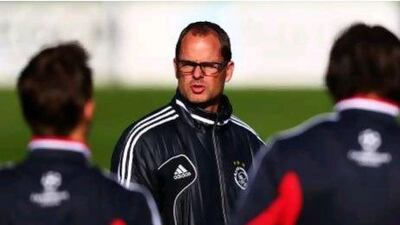In the so-called Group of Death of this season's Uefa Champions League, the first grave that was being dug by forecasters after August's draw was that of Ajax.
Dutch champions they may be, and four-time European Cup-holders, but in a quartet including the reigning champions of Spain, Real Madrid, of England, Manchester City, and of Germany, Borussia Dortmund, the search for a middleweight among the superheavies naturally focused on Ajax.
They would be out of their depth, it was assumed: the Netherlands' Eredivisie is ranked the eighth best domestic competition in Europe by Uefa. Spain, England, Germany rate as first, second and third.
But tonight in Manchester, Ajax have the opportunity to all but knock City out of Europe, to likely deprive them even of third place in the group and complete an upset that they began last month with a 3-1 win over the Premier League champions in Amsterdam.
Ajax's head coach Frank De Boer observes that his club's entire operating budget would not stretch to the transfer fees City have spent merely on the four strikers Sergio Aguero, Carlos Tevez, Mario Balotelli and Edin Dzeko. In economic terms, Ajax beating City is not quite David overcoming Goliath, but there was, two weeks ago, an element of careful slingshots proving more effective than powerful cannons.
De Boer can take great credit for that. He is a coach of rapidly rising esteem, even if Ajax's current position in the Eredivisie, defending their league title, is unusually low. At the weekend, they lost their first league match of the domestic campaign and sit fifth in the table.
It is easy to diagnose that as a symptom of transition. Yet transition is a permanent state for successful Ajax squads.
The best Dutch players leave and usually do so when young, in pursuit of the higher salaries of wealthier, larger leagues.
De Boer knows that from his own experience as a player and is shaping his first foray into senior management around that reality, learning to be flexible, to survive in a predatory market for talent.
De Boer played more than 400 times for Ajax in a distinguished career that began in the club's fabled youth academy, De Toekomst.
He came through those ranks alongside his twin brother, Ronald, who was equally gifted, almost identical to look at, but very much the yin to Frank's yang as a player. Frank is left-footed, Ronald stronger with his right. Ronald was a versatile player but an attacking one, from midfield or up front. Frank played in defence.
But he was a defender very much in the elegant, forward-thinking Ajax and Dutch tradition. No giant, he became a commanding centre-half through his tactical intelligence and shrewd positional sense. He had a precise long pass and an ease in possession. He had leadership, too, and captained his country for long periods of his 112-cap career with Holland.
Both De Boers were members of the last Ajax to win the Champions League, in 1995. The same year, the Bosman law came into being, transforming the economy of European football by enshrining freedom of movement by players.
Its most dramatic initial effect would be on the Ajax of the mid-1990s, seven of whose players went within the space of months to Barcelona, including both De Boers.
Ajax have been a club where the heavyweights go to recruit ever since.
Last summer they said goodbye to Jan Vertonghen, bought by Tottenham Hotspur, Vurnon Anita (Newcastle United), Gregory van der Wiel (Paris Saint-Germain), a trio of influential internationals.
The academy maintains its high reputation for producing clever, rounded players and indeed, the kinds of men who have the assets to become managers. De Boer's support team includes his near-contemporaries, such as Dennis Bergkamp and Marc Overmars, both former Ajax and Holland footballers.
He has certainly instilled confidence since taking over as head coach in December 2010. Six other managers had passed in and out of the club in half a dozen years before that and De Boer was promoted from assistant coach - he had been working under Martin Jol - amid a climate of boardroom tension.
He skilfully distanced himself from that and led a young team to the 2011 title, an achievement he would repeat a year later.
De Boer turned down an invitation to talk to Liverpool about their vacancy of earlier this year, believing he had work still do in Amsterdam. It will not be the last offer the 42 year old receives from a club with larger resources than Ajax.
Follow us


